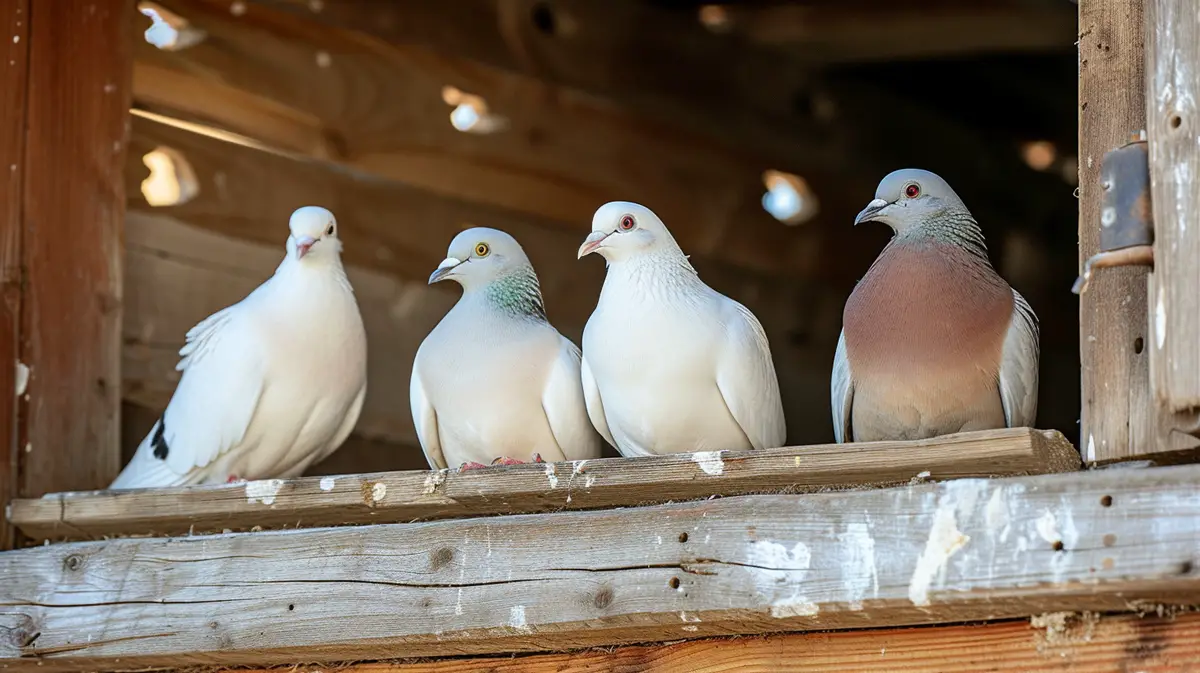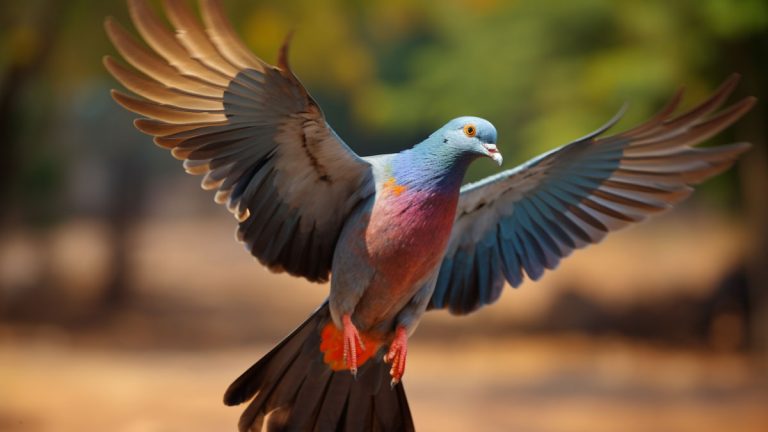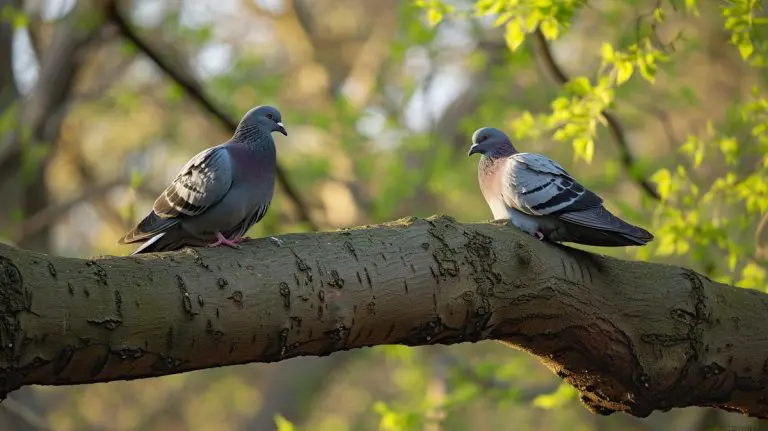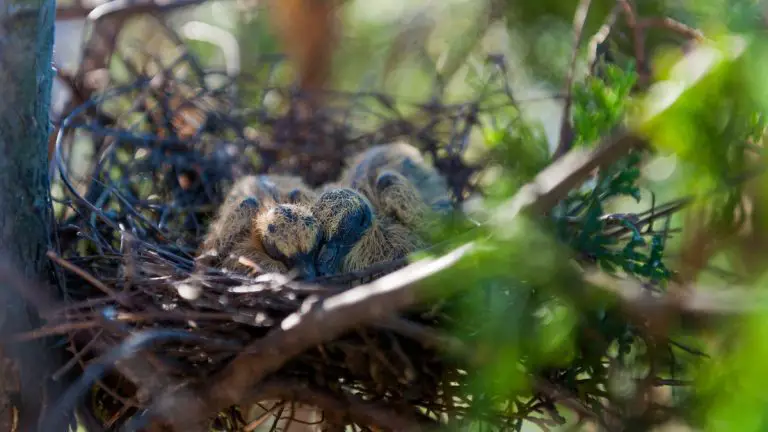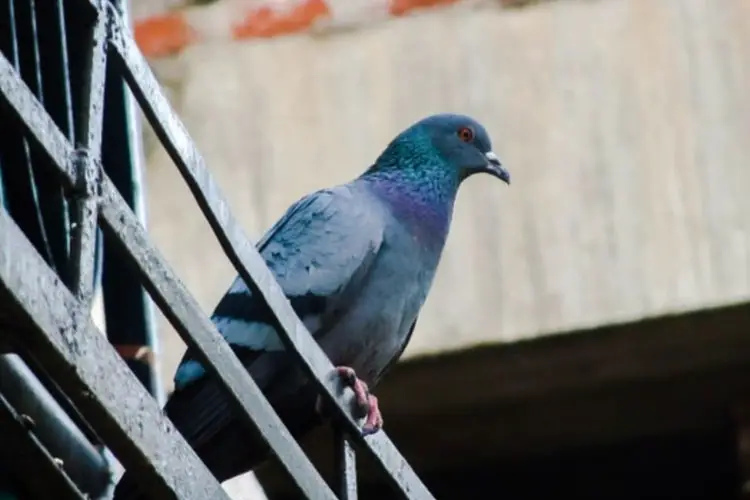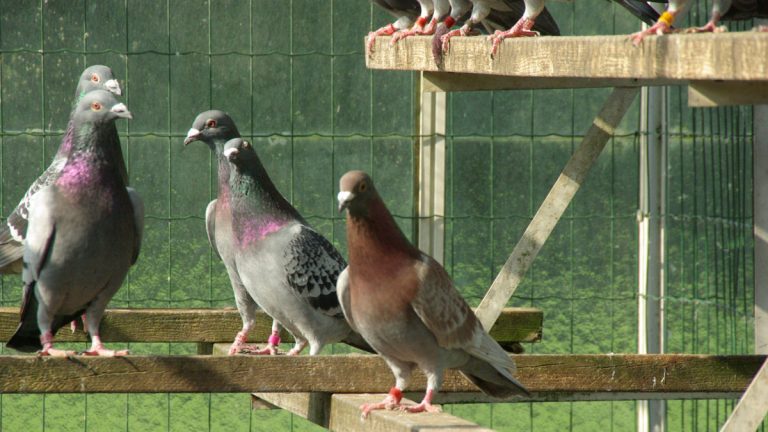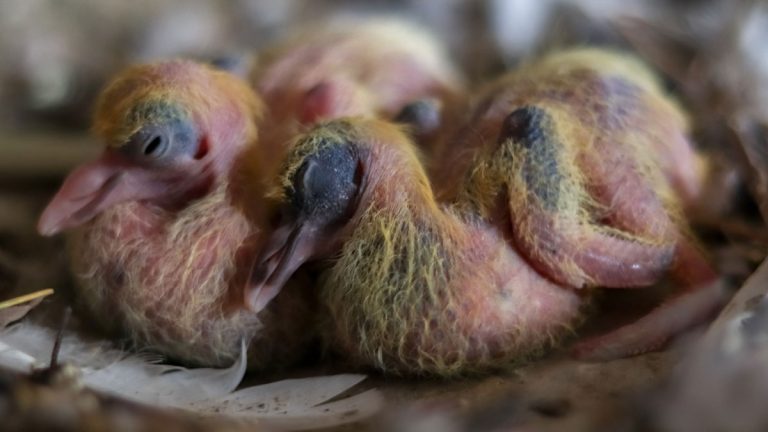Discover the Lifespan of Pet Pigeons – The Ultimate Guide
Hey there, fellow bird enthusiasts! If you’ve ever considered welcoming a pet pigeon into your home, you might be wondering about their lifespan. Well, wonder no more! In this article, I’ll be diving into the fascinating world of pet pigeon lifespan, shedding light on how long these feathered friends can stick around.
When it comes to pet pigeons, their lifespan can vary depending on several factors. From genetics to diet and care, there are a few key elements that can influence how long your pigeon companion will be by your side. So, if you’re curious about what to expect when it comes to the lifespan of your feathered pal, keep reading!
Factors Affecting Pet Pigeon Lifespan
When it comes to the lifespan of pet pigeons, there are several factors that can have an impact on how long they live. As a responsible pigeon owner, it’s essential to understand these factors and their influence. Here are the key factors that can affect the lifespan of pet pigeons:
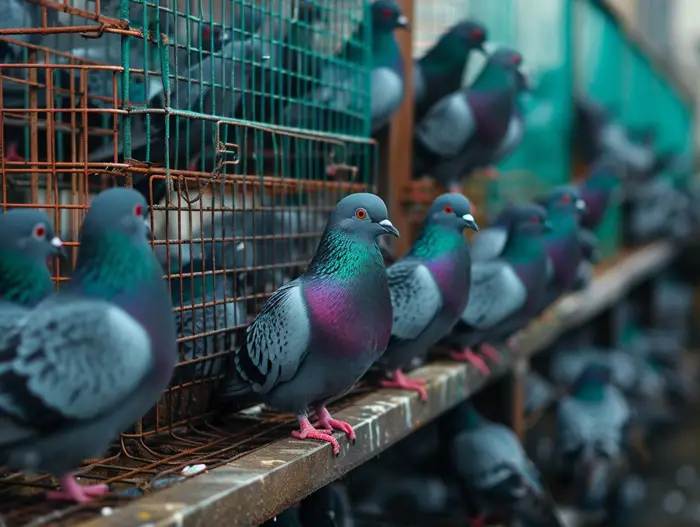
- Genetics: Just like with humans, genetics play a significant role in the lifespan of pet pigeons. Some genetic factors can predispose pigeons to certain health conditions or influence their overall vitality. While we have limited control over genetics, it is important to choose pigeons from reputable breeders who prioritize the health and longevity of their birds.
- Diet: A proper and balanced diet is crucial for the well-being and longevity of pet pigeons. Feeding them a nutritious blend of pigeon feed, along with occasional treats like fruits and vegetables, can contribute to their overall health. It’s important to provide them with fresh water daily and ensure they have access to grit, which aids in digestion.
- Care and Housing: Providing proper care and a suitable housing environment is essential for the well-being of pet pigeons. A clean and spacious loft or cage with adequate ventilation is vital. Regular cleaning, prevention of overcrowding, and protection against predators are also important aspects of pigeon care that can impact their lifespan.
- Healthcare: Regular veterinary check-ups and vaccinations are crucial to maintaining the health of pet pigeons. It’s important to monitor them for any signs of illness or injury and seek prompt medical attention when needed. Preventative measures such as deworming and parasite control also contribute to their overall well-being.
- Exercise and mental stimulation: Pigeons are active birds that require regular exercise and mental stimulation to thrive. Allowing them time outside of their cage or loft to stretch their wings and fly can contribute to their overall health and well-being. Providing toys, perches, and opportunities for social interaction can also help keep them mentally stimulated.
Remember, while these factors can influence the lifespan of pet pigeons, individual variations can still occur. By providing proper care, a healthy diet, and regular attention to their well-being, you can help ensure that your pet pigeons live a long and happy life.
Genetic Considerations
When it comes to the lifespan of pet pigeons, genetics play a crucial role. Just like humans, the genetic makeup of pigeons can influence their life expectancy.
The breeding history of the pigeons is an important factor to consider. Choosing pigeons from reputable breeders who prioritize the health and longevity of their birds can significantly impact their lifespan. This is because breeders who carefully select their pigeons for desirable traits are more likely to produce offspring with strong genetic foundations.
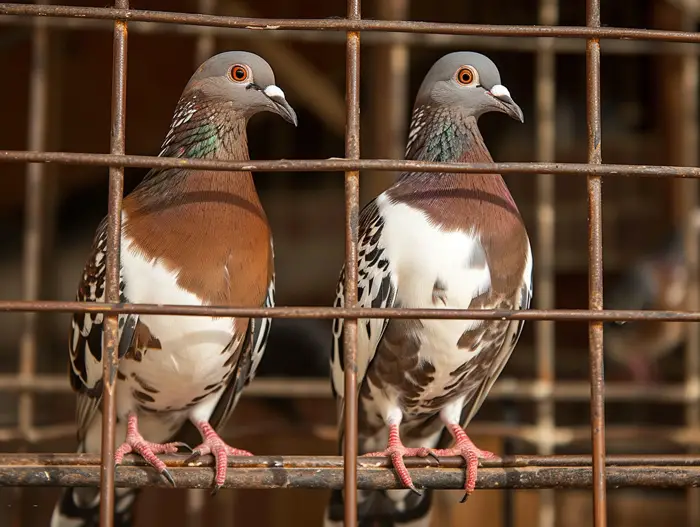
Certain genetic factors can also predispose pigeons to specific health conditions or shorten their lifespan. For example, some pigeons may be more susceptible to respiratory illnesses or reproductive disorders due to genetic traits. Being aware of these potential health risks can help pet pigeon owners provide the necessary care and accommodations to minimize their impact on the bird’s overall well-being.
It’s worth noting that while genetics play a significant role, a well-rounded approach to pigeon care is essential. Providing a balanced diet, proper care and housing, regular veterinary check-ups, and exercise and mental stimulation are all crucial components to ensuring the longevity of a pet pigeon.
With these considerations in mind, pet pigeon owners can take proactive steps to maximize their bird’s lifespan and provide them with a fulfilling and comfortable life. Moving forward, let’s explore how diet can influence the lifespan of pet pigeons.
Diet and Nutrition
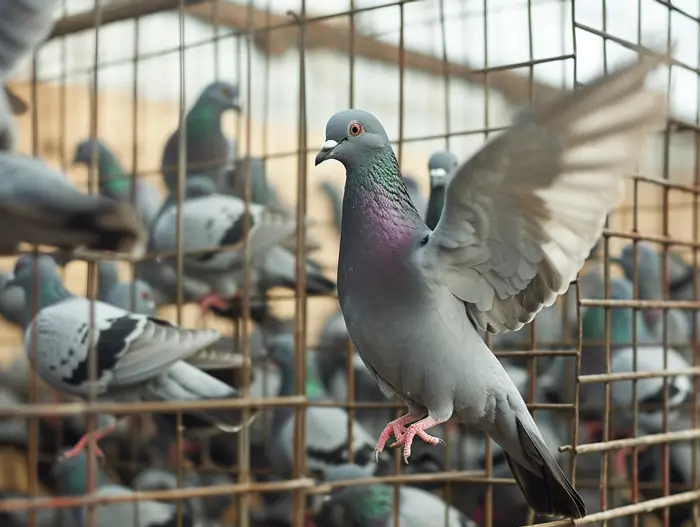
When it comes to the lifespan and overall health of your pet pigeons, diet and nutrition play a crucial role. Providing them with a balanced and nutritious diet is key to ensuring their well-being. Here are some important considerations to keep in mind:
- Variety is key: Just like humans, pigeons need a diverse and well-rounded diet to thrive. Including a variety of foods in their daily meals ensures that they receive all the necessary nutrients. Some ideal food options for pigeons include seeds, grains, leafy greens, fruits, and vegetables.
- Quality matters: Ensuring that the food you provide is of high quality is essential. For optimal nutrition, choose food options that are specifically formulated for pigeons. These options are designed to meet their dietary needs and provide them with the necessary vitamins and minerals.
- Avoid unhealthy treats: While it’s tempting to offer treats to your pigeons, it’s important to choose them wisely. Avoid feeding them foods that are high in sugar, salt, or fat, as these can be detrimental to their health. Stick to nutritious treats like small pieces of fruits or vegetables.
- Hydration is crucial: Just like any other living being, pigeons require constant access to clean and fresh water. Make sure to provide them with a steady supply of water that is changed regularly to prevent the growth of bacteria or contamination.
Remember, maintaining a healthy diet is just one aspect of ensuring the longevity of your pet pigeons. Alongside a nutritious diet, it’s important to provide them with proper care, regular veterinary check-ups, exercise, mental stimulation, and a suitable living environment. By taking a holistic approach to their well-being, you can help them live a long and healthy life.
Care and Environment
Now that we’ve covered the importance of a balanced diet, let’s turn our attention to the care and environment that can significantly impact the lifespan and overall health of pet pigeons. Taking proper care of your feathered friends involves more than just providing them with nutritious food. You need to create an environment that meets their physical, psychological, and social needs. Here are some key aspects to consider:
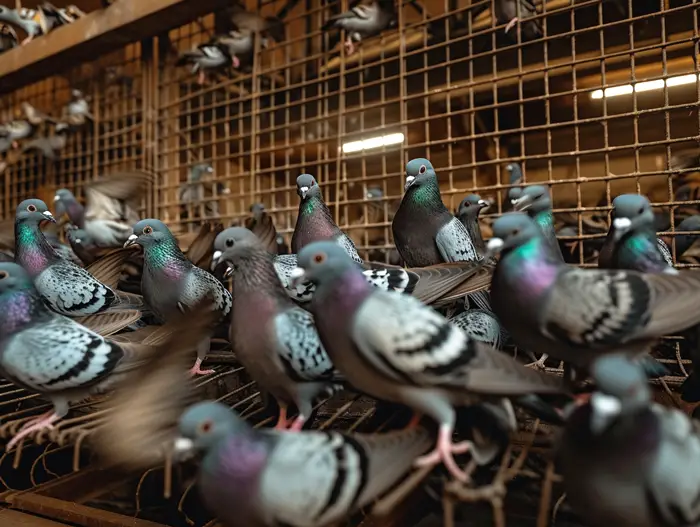
1. Housing
Pigeons need a safe and comfortable place to call home. Ideally, you should provide them with a spacious aviary that allows them to move around freely and exercise their wings. The aviary should be well-ventilated and protected from extreme weather conditions. Make sure the wire mesh is small enough to prevent predators from entering and large enough to allow the birds to stretch their wings.
2. Cleanliness
Maintaining cleanliness is crucial for the health of your pigeons. Regularly clean their housing area to remove droppings and debris. Dirty conditions can lead to the growth of bacteria and parasites, which can cause diseases. Ensure that the water and food containers are cleaned and refilled daily to provide them with fresh and uncontaminated resources.
3. Enrichment
Pigeons are intelligent creatures that benefit from mental stimulation. Engage their minds by providing them with toys, perches, and branches to explore and interact with. Creating different levels and surfaces in their aviary can also mimic their natural habitat and provide them with opportunities for exercise and exploration.
4. Safety Measures
Pigeons are susceptible to predators, both in the wild and captivity. Install predator deterrents such as netting or fencing to ensure their safety. Additionally, keep plants and toxic substances out of reach, as pigeons may mistakenly ingest them, leading to serious health issues.
5. Social Interaction
Pigeons are social animals and thrive in the company of their own kind. Consider having more than one pigeon if space allows, as this will provide them with companionship and reduce the risk of loneliness. Human interaction is also essential. Spend quality time with your pigeons, talking to them and gently handling them to build trust and strengthen the bond between you.
Common Health Issues
As pet pigeon owners, we need to be aware of and understand the common health issues that can affect our feathered friends. Taking proactive measures and being equipped with knowledge can help ensure the well-being and longevity of our beloved pigeons. Here are a few common health issues that pet pigeons may encounter:
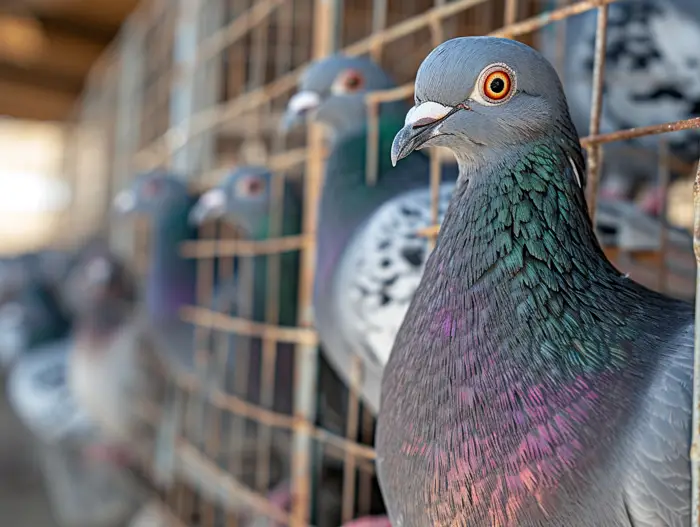
1. Respiratory Problems
Respiratory issues can be a significant concern for pigeons. Some common respiratory problems in pet pigeons include:
- Pigeon Respiratory Disease (PRD): This respiratory condition can be caused by various factors such as viral, bacterial, or fungal infections. It can result in symptoms like coughing, sneezing, nasal discharge, and difficulty breathing.
Taking preventive measures such as ensuring a clean and well-ventilated living environment and regular veterinary check-ups can help detect and treat respiratory issues early on.
2. Parasites
Pigeons can be susceptible to parasitic infestations, including:
- External Parasites: Mites and lice can often affect the feathers, skin, and overall health of pet pigeons. Regular grooming and the use of appropriate anti-parasitic treatments can help prevent and manage these infestations.
- Internal Parasites: Worms and other internal parasites can affect the digestive system and overall health of pigeons. Routine fecal examinations and deworming treatments, as recommended by a veterinarian, can help keep internal parasites in check.
3. Nutritional Imbalances
A balanced and nutritious diet is crucial for the health of pet pigeons. Nutritional imbalances can lead to various health issues, including:
- Vitamin Deficiencies: Inadequate intake of essential vitamins (such as Vitamin A, D, and E) can weaken the immune system and affect overall health.
- Calcium Deficiency: Insufficient calcium intake can lead to weak bones, eggshell problems in breeding pigeons, and muscle tremors.
Providing a well-rounded diet that includes a variety of seeds, grains, leafy greens, fruits, and vegetables, along with a commercially formulated pigeon diet, can help prevent nutritional imbalances.
Conclusion
Ensuring a long and healthy lifespan for your pet pigeon requires a holistic approach to their care. By providing a diverse and well-rounded diet, including seeds, grains, leafy greens, fruits, and vegetables, you can ensure that your pigeon receives the necessary nutrients for optimal health. It’s important to avoid unhealthy treats that are high in sugar, salt, or fat, as these can lead to nutritional imbalances and health issues.
In addition to a proper diet, constant access to clean and fresh water is vital for your pigeon’s well-being. Hydration is key to maintaining their overall health and preventing dehydration-related complications.
Regular veterinary check-ups are crucial to detect and manage any potential health issues. Respiratory problems, parasites, and nutritional imbalances are common concerns for pet pigeons, but with proper care and preventive measures, these issues can be minimized.
By following these guidelines and providing the best possible care, you can ensure that your pet pigeon lives a long and happy life. Remember, a well-nourished and well-cared-for pigeon is a healthy pigeon.
